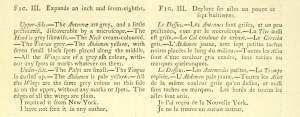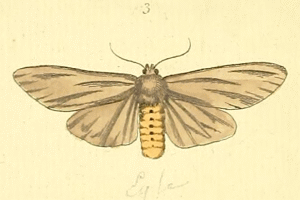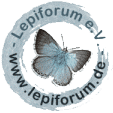

 +3Kontinente:EUNA
+3Kontinente:EUNA3. Biologie
3.1. Nahrung der Raupe
- [Apocynaceae:] Asclepias sp. (Seidenpflanze)
- [Apocynaceae:] Apocynum sp.
Hendrickson (2014: 57) fasst zu den USA zusammen: "The larvae are known to feed on milkweed (Asclepias species) (Covell 1984, Wagner 2005), but have been observed feeding on dogbane (Apocynum species) (Wagner 2005) and adults may be found on hostplants during the day (Covell 1984). The caterpillars typically prefer to feed on older shoots and so are rarely observed on the same shoots as monarch caterpillars (Danaus plexippus) which generally prefer younger shoots (Wagner 2005). These caterpillars are solitary in later instars, but are gregarious during instars 1–3 (Rea et al. 2003)."
4. Weitere Informationen
4.1. Andere Kombinationen
- Phalaena egle Drury, 1773 [Originalkombination]
4.2. Faunistik
E. egle ist natürlicherweise auf die USA und den Süden Kanadas beschränkt. Hendrickson (2014: 57) fasst zur Verbreitung der Art in den USA zusammen: "This species has the broadest range of the genus, spanning from Maine as far west as Minnesota, Iowa, and Missouri as well as a southern range spanning from North Carolina as far west as southeastern Arizona and as far south as the southernmost tip of the horn of Texas."
Die Autorin (S. 58) erwähnt aber auch eine Verschleppung nach Europa, speziel Ungarn: "There is one record of E. egle occurring in Szeged Hungary on 8 May 1983 and 28 May 1984, due to introduction (Kovács 1985). There have been no further records to suggest that establishment occurred." Die Primärquelle und die Details zu den beiden Funden in Szeged in Ungarn sind mir noch nicht bekannt. Sicher ist nur, dass es zu keiner Ansiedlung kam. Eine solche wäre in Europa allenfalls in Parks mit Asclepias-Pflanzungen ganz im Süden oder vor allem auf den Kanarischen Inseln möglich. Immerhin: Die Angabe aus Ungarn ist durch einen Beleg abgesichert. Daniel Bartsch vom Staatlichen Museum für Naturkunde meldete mir dazu per e-Mail (14. August 2023): "Die Sammlung Kovács ist im SMNS und darin ist ein frisch wirkendes Weibchen dieser Art vom 8 May 1983 aus Tápé / Ungarn."
(Autor: Erwin Rennwald)
4.3. Literatur
- Erstbeschreibung: Drury, D. (1773): Illustrations of Natural History. Wherein are exhibited Upwards of Two Hundred and Twenty Figures of Exotic Insects, According to their different Genera; Very few of which have hitherto been figured by any Author, Being engraved and coloured from Nature, with the greatest Accuracy, and under the Author's own Inspection, On Fifty Copper-Plates. With a particular Description of each Insect: Interspersed with Remarks and Reflections of the Nature and Properties of many of them. Vol. II: i-vii, 1-90, pl. I-L, Index to the First Volume, Errata and Addenda to the First Volume [not paginated], Index to the Second Volume, Errata and Addenda to the Second Volume [not paginated]. London.
- Hendrickson, H.M. (2014): A monographic revision of Euchaetes Harris (Lepidoptera: Erebidae: Arctiinae). - xiv+217 p.; A thesis submitted to the Faculty of University of Minnesota. [PDF auf core.ac.uk]








